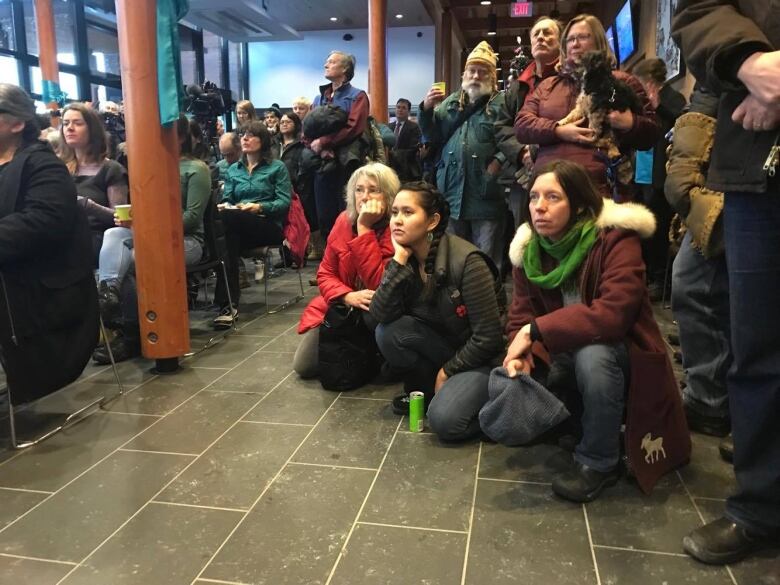Supreme Court's Peel decision 'a victory for democracy,' First Nations say
'It's the outcome that we were hoping for,' said Roberta Joseph, Chief of the Tr'ondëk Hwëch'in First Nation

A group of Yukon First Nations and environmental groups say Friday's decision from the Supreme Court of Canada on the Peel watershed planning process is "a huge victory" for them.
"It's the outcome that we were hoping for," said Roberta Joseph, Chief of the Tr'ondëk Hwëch'in First Nation, one of three First Nations who fought the case.
- Supreme Court rules in favour of Yukon First Nations in Peel watershed dispute
- First Nations, environmentalists take fight for Peel watershed to Supreme Court
"This is a victory for the Peel watershed, and the integrity of our final agreements. This is a victory for democracy, Yukon First Nations, and Yukoners."
In a unanimous decision, the top court overturned a Yukon Appeals Court ruling that rolled back years of planning and instead ordered the Yukon government to consider a final recommended plan proposed in 2011 by an independent commission.
The land use plan would determine the fate of the Peel watershed region in north Yukon, a vast expanse of sub-Arctic wilderness. The commission's final recommended plan would protect about 80 per cent of the area from development.
The Yukon government, in 2012, sought to discard that plan in favour of its own, which would protect just 30 per cent of the area.
'Our choice was never to go to court'
Friday's ruling made clear that the government's 2012 plan had no validity, as it ignored the land use planning process spelled out in Yukon's Umbrella Final Agreement with First Nations.
"The decision from the Supreme Court of Canada has upheld our final agreements," Joseph said.
"Our choice was never to go to court, but the former government's idea of land use planning breached our final agreements, and we had no choice but to protect them."

Yukoners elected a new government last year, and Premier Sandy Silver has said that he would accept the final recommended plan from the Peel planning commission.
On Friday, he reiterated that, and agreed with the First Nations that the top court's ruling was "a victory for all of Yukon."
"Today, we move forward. Today, we move forward with clarity, and most importantly, we move forward together," he said.
"We believe that when people look back at this moment in time, they're going to see this as the beginning of a new era, one that's based upon reconciliation."
Government can reject plan
The Supreme Court ruling, however, does not force the Yukon government to adopt the final plan. That may have implications for future land use planning processes in Yukon, which have been on hold pending the resolution of the Peel case.
"It is premature to interpret the scope of Yukon's authority to reject the Final Recommended Plan after it consults with the affected First Nations, and it is unnecessary to do so in order to resolve this appeal," the decision reads.
The court orders the planning process back to the point where "Yukon can approve, reject, or modify the Final Recommended Plan as it applies to non-settlement land after consultation with the specified parties."

But Margaret Rosling, a lawyer who represented the Tr'ondëk Hwëch'in, Na-Cho Nyäk Dün, and Vuntut Gwitchin First Nations, as well as the Canadian Parks and Wilderness Society and the Yukon Conservation Society in the case, insists the government cannot do more than tinker with the Peel plan at this point.
"It's not open to the government to reject in this case. And that is because of their finding based on an admission that was made by the Yukon Government in front of the court, that there were no changing circumstances in this case," she said.
"They are bound to act in a matter that is consistent with the honour of the Crown, and that fosters reconciliation with Aboriginal people. And any modification have to be only minor."
Rosling calls the Supreme Court ruling "a huge victory," and "a complete success for these plaintiffs."

Silver also gave no indication that his Liberal government would scrap the work that's been done already.
"We have always supported the final recommended plan, and now we have the ability to return to that final plan," he said Friday. "We're very keen to start working towards finalizing a regional land use plan that now reflects a shared vision."
Silver says he's also looking forward to getting land use planning "back on track," elsewhere in the territory.
First Nations leaders agreed that Friday's decision was a long time coming, and it marks a new beginning.
"It could not have come at a better time — Canada can lead when it comes to wildlife and environmental protection," said Vuntut Gwitchin Chief Bruce Charlie.
Na-Cho Nyäk Dün Chief Simon Mervyn agreed, and thanked Yukoners for joining the fight.
"We're on the right path for environmental protection, and to preserve the integrity of the environment," he said.
